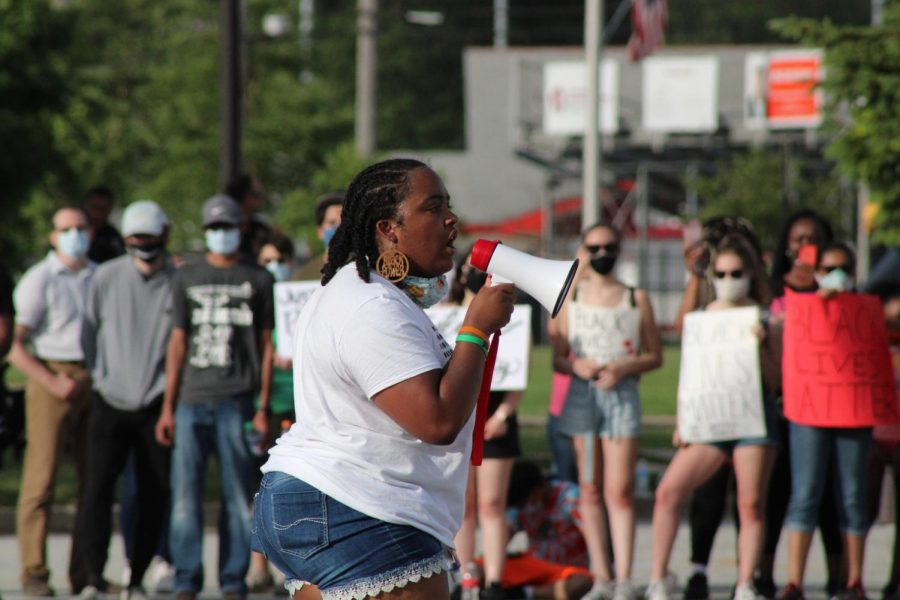NO JUSTICE NO PEACE Speaking on a megaphone to a listening crowd, Kayla Prowell, class of ‘19, recites a poem during the protest that occurred June 5. Kayla also later helped plan a second protest at the town hall. Munster saw a surge of students, graduates and adult support in response to the resurgence of Black Lives Matter this year, paralleling the peaceful protests that have been sparked throughout the nation, “We’re tired of having to do this. We’re tired of having to fight for our rights over and over and over again. We fought for them 300 years ago, we fought for them 100 years ago, we fought for them 60 and 50 years ago. We’re always fighting, and I think that we’re tired of being our own advocates. We’re tired of people not being tired of being racist.”
More than a movement
Students speak on Black Lives matter and against racial discrimination
A sea of masked faces populate the street of Columbia Avenue. Signs are held firmly in the air, bearing phrases such as “neutrality equals oppression” and “justice for George Floyd.” The crowd drifts apart to form a circular opening. A person (someone from protest) stands in the midst,
megaphone in hand. The crowd, though remaining distanced and masked, stands in solidarity to listen.
“The main takeaway that I had from the protest is that people care,” Kayla Prowell, class of ‘20, said. “I hope that people can take away that this isn’t over. This isn’t something that happened once, and just because the news stopped covering it, it’s done. People are still out there marching and putting their lives at risk to try and ensure that other people aren’t going to lose their lives just for the way they look.”
Ever since the graphic video of George Floyd’s death at the hands of police in late May was released, outbursts of protest online and in streets became intensely prominent. Though the Black Lives Matter movement was initiated in 2013 in light of the killing of 17-year-old Trayvon Martin, the new resurgence of this year has seen more allyship and support from other groups than before.
“This past June, I attended my first BLM protest in Lansing, Illinois,” Laura Marguia, junior, said. “I went into the march thinking ‘All Lives Matter’ was for anyone who is consistently discriminated against, whethe
r it be the Black community, the LGBTQ+ community or any other minority group out there. While at the rally portion of the protest, activists and educators of the movement gave us their stories, insights and feelings about this entire movement. These activists and educators also taught us what the All Lives Matter actually meant and how it is extremely offensive. I was so moved by the speakers and all those who attended the protest that I began educating myself more at
home about the Black community and educating those in my family about it too.”
The overwhelming support for the movement has not been without backlash. Local protestors can recount numerous scenarios in which passersby have yelled threateningly at peaceful participants.
“I have only attended the peaceful protests. I’ve gotten to witness the racist people in my area,” Laila Mosely, junior, said. “There were racial slurs yelled towards us and curse words. It was terrifying. In the
end, we were the ones standing up for our people and change needs to happen.”
Though this divisive clash has become more pronounced on streets, some say the issue has been a problem for even longer and is located even closer—at school.
“It happens within sports, classrooms, hallways and even social media,” Laila said. “Some students think it’s okay to say the n-word to our faces and make ‘black’ jokes. When students make these jokes, they try to make us feel better by saying ‘no offense’ or something that they think makes us feel better. In reality, we still feel uncomfortable.”
Racial implications, though now a national discussion, have been affecting students on an individual basis, some of them for a lifetime.
“Throughout my childhood I struggled with my identity and my self esteem because I was never enough for anyone, and I felt out of place when I didn’t fit into the categories that everyone favored,” Amaya Dandridge, junior, said. “I wouldn’t say anything to everyone that made me feel less than, I would just hope that when they look back on that event they realize it was wrong, and that they’ve grown and changed since then.”
The underlying racial inequities students face has been a longstanding issue that has only been recently discussed. With school sponsored organizations and clubs such as this year’s student-led African American Culture Club, and the newly coordinated Minority Committee, school efforts to troubleshoot ingrained disparities are clear. Sydni Branch, senior, was not only invited to attend the minority meeting, but is one of six officers of the African American Culture Club.
“I really appreciate MHS for inviting me to be a part of such a momentous committee,” Sydni Branch, senior, said. “The formation of this committee shows that the School Town of Munster is dedicated to all of its students. Change will never be made unless there is action, and with the creation
of this committee, change is bound to happen.”
